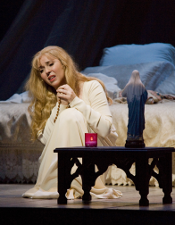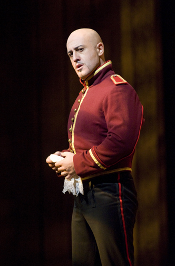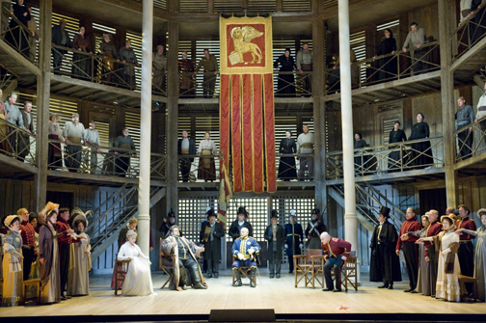![Johan Botha as Otello [Photo by Terrence McCarthy courtesy of San Francisco Opera]](http://www.operatoday.com/Otello_Botha.png)
02 Dec 2009
Otello in San Francisco
Sir Peter Hall created this production of Otello at Chicago Lyric Opera in 2001.
English Touring Opera are delighted to announce a season of lyric monodramas to tour nationally from October to December. The season features music for solo singer and piano by Argento, Britten, Tippett and Shostakovich with a bold and inventive approach to making opera during social distancing.
This tenth of ten Live from London concerts was in fact a recorded live performance from California. It was no less enjoyable for that, and it was also uplifting to learn that this wasn’t in fact the ‘last’ LfL event that we will be able to enjoy, courtesy of VOCES8 and their fellow vocal ensembles (more below …).
Ever since Wigmore Hall announced their superb series of autumn concerts, all streamed live and available free of charge, I’d been looking forward to this song recital by Ian Bostridge and Imogen Cooper.
The Sixteen continues its exploration of Henry Purcell’s Welcome Songs for Charles II. As with Robert King’s pioneering Purcell series begun over thirty years ago for Hyperion, Harry Christophers is recording two Welcome Songs per disc.
Although Stile Antico’s programme article for their Live from London recital introduced their selection from the many treasures of the English Renaissance in the context of the theological debates and upheavals of the Tudor and Elizabethan years, their performance was more evocative of private chamber music than of public liturgy.
In February this year, Albanian soprano Ermonela Jaho made a highly lauded debut recital at Wigmore Hall - a concert which both celebrated Opera Rara’s 50th anniversary and honoured the career of the Italian soprano Rosina Storchio (1872-1945), the star of verismo who created the title roles in Leoncavallo’s La bohème and Zazà, Mascagni’s Lodoletta and Puccini’s Madama Butterfly.
Evidently, face masks don’t stifle appreciative “Bravo!”s. And, reducing audience numbers doesn’t lower the volume of such acclamations. For, the audience at Wigmore Hall gave soprano Elizabeth Llewellyn and pianist Simon Lepper a greatly deserved warm reception and hearty response following this lunchtime recital of late-Romantic song.
Collapsology. Or, perhaps we should use the French word ‘Collapsologie’ because this is a transdisciplinary idea pretty much advocated by a series of French theorists - and apparently, mostly French theorists. It in essence focuses on the imminent collapse of modern society and all its layers - a series of escalating crises on a global scale: environmental, economic, geopolitical, governmental; the list is extensive.
For this week’s Live from London vocal recital we moved from the home of VOCES8, St Anne and St Agnes in the City of London, to Kings Place, where The Sixteen - who have been associate artists at the venue for some time - presented a programme of music and words bound together by the theme of ‘reflection’.
'Such is your divine Disposation that both you excellently understand, and royally entertaine the Exercise of Musicke.’
Amongst an avalanche of new Mahler recordings appearing at the moment (Das Lied von der Erde seems to be the most favoured, with three) this 1991 Mahler Second from the 2nd Kassel MahlerFest is one of the more interesting releases.
‘And there was war in heaven: Michael and his angels fought against the dragon; and the dragon fought and his angels, And prevailed not; neither was their place found any more in heaven … that old serpent … Satan, which deceiveth the whole world: he was cast out into the earth, and his angels were cast out with him.’
If there is one myth, it seems believed by some people today, that probably needs shattering it is that post-war recordings or performances of Wagner operas were always of exceptional quality. This 1949 Hamburg Tristan und Isolde is one of those recordings - though quite who is to blame for its many problems takes quite some unearthing.
There was never any doubt that the fifth of the twelve Met Stars Live in Concert broadcasts was going to be a palpably intense and vivid event, as well as a musically stunning and theatrically enervating experience.
‘Love’ was the theme for this Live from London performance by Apollo5. Given the complexity and diversity of that human emotion, and Apollo5’s reputation for versatility and diverse repertoire, ranging from Renaissance choral music to jazz, from contemporary classical works to popular song, it was no surprise that their programme spanned 500 years and several musical styles.
The Academy of St Martin in the Fields have titled their autumn series of eight concerts - which are taking place at 5pm and 7.30pm on two Saturdays each month at their home venue in Trafalgar Square, and being filmed for streaming the following Thursday - ‘re:connect’.
The London Symphony Orchestra opened their Autumn 2020 season with a homage to Oliver Knussen, who died at the age of 66 in July 2018. The programme traced a national musical lineage through the twentieth century, from Britten to Knussen, on to Mark-Anthony Turnage, and entwining the LSO and Rattle too.
With the Live from London digital vocal festival entering the second half of the series, the festival’s host, VOCES8, returned to their home at St Annes and St Agnes in the City of London to present a sequence of ‘Choral Dances’ - vocal music inspired by dance, embracing diverse genres from the Renaissance madrigal to swing jazz.
Just a few unison string wriggles from the opening of Mozart’s overture to Le nozze di Figaro are enough to make any opera-lover perch on the edge of their seat, in excited anticipation of the drama in music to come, so there could be no other curtain-raiser for this Gala Concert at the Royal Opera House, the latest instalment from ‘their House’ to ‘our houses’.
"Before the ending of the day, creator of all things, we pray that, with your accustomed mercy, you may watch over us."
![Johan Botha as Otello [Photo by Terrence McCarthy courtesy of San Francisco Opera]](http://www.operatoday.com/Otello_Botha.png)
Sir Peter Hall created this production of Otello at Chicago Lyric Opera in 2001.
While the SFO program booklet credits the production to Mr. Hall it does not provide a biography of his accomplishments, a tool useful for placing a production in context. That Sir Peter founded the Royal Shakespeare Company and was the general director of Britain’s National Theatre would tell us that we have a theatrically sophisticated director, that he was the general director of the Glyndebourne Festival well establish him as a sophisticated opera director. It would be interesting to know what Peter Hall opera and theater productions have previously played in San Francisco — Chicago Lyric boasts five Peter Hall productions, Denver premiered his ill-fated Tarquinius, Los Angeles Opera gave us his former wife Maria Ewing as his Salome.
However Peter Hall’s Otello was staged in San Francisco by Australian Stephen Barlow for whom there is a biography that includes assisting many directors at Glyndebourne and Covent Garden and staging many revival productions, i.e. originally directed by someone else. Curiosity nags about the original Peter Hall Otello with Ben Heppner and its Glyndebourne revival with David Rendall and if these performances achieved the formidable stature of Mr. Barlow’s San Francisco staging with Johan Botha.
 Zvetelina Vassileva (Desdemona)
Zvetelina Vassileva (Desdemona)
Perhaps key to understanding this fine San Francisco Otello is the Desdemona of Bulgarian soprano Zvetelina Vassileva, a role she has previously performed only in Sofia (according to the program booklet biography). Mme. Zvetelina possesses a large, quite beautiful Slavic voice, and seems to be a careful musician. She was able to project a waif like, lost presence, and hold these attributes for the duration of the performance, never complicating Verdi’s heroine with an Italianate sweetness and beauty, or the pathos that Verdi imbued into his last act.
Dressed in white, with a blond wig, Mme. Vassileva evoked Bianca, the phantom lover of Cassio and she was the symbol of the vulnerable side of Shakespeare’s fierce fighter, the inflamed warrior who would succumb to the power of Venus. This Desdemona was not presaging verismo’s melodramatic heroine, rather she was the Venus that destroyed Otello, and therefore she was a part of Otello himself. Mme. Vassileva’s quite powerful voice could indeed equate his presence. She was never his victim, as he himself was his victim.
Shakespeare’s Otello is of course black though current custom proscribes black face, but even so the complete whiteness of the cloth draped stage was in absolute conceptual contrast to Verdi’s moor dressed in brown robes, uniquely exotic among the otherwise Victorian clothed cast. The unit set of the first three acts was an abstracted old Globe wooden theater, abstracted shudders and a ceiling fan hinting a southern climate, simple wooden desks or benches placed to accommodate the actors’ moves necessary to inflame and expose Otello’s vulnerability.
 Marco Vratogna (Iago)
Marco Vratogna (Iago)
In contrast to the Met’s massive Zefferelli, grand opera production, the Peter Hall production is an anti-Otello, the storm is only seen in the reaction of the chorus, the beauty of the evening star is realized on the faces and in the voices of Otello and Desdemona. Verdi’s opera became about Shakespeare’s words, his poetry and Otello’s tragedy, and not about the spectacle of nature’s destructive and intoxicating powers.
In the San Francisco staging Iago was embodied by Italian baritone Marco Vratogna, small of stature, wily, a shaved head, an archetypical untrustworthy look. If Otello and Desdemona were abstracted black and white characters, Iago was real, and really mean, with strong TV drama body language, his powerful voice in grand theatrical contrast to his affected servile stance. He delivered his “Credo” as a shouted harangue, beautifully sung to be sure, downstage center directly at the audience. Chilling, and eminently satisfying.
South African tenor Johan Botha is a real Otello, vocally and temperamentally, a voice huge enough to overpower a melee of his soldiers and establish himself as the invincible warrior, with sufficient Italianate vocal gestures to supplicate the bacio from Desdemona, his hysteria and temper flaring all the while. It was all there in Verdi’s first act, and played out in the following two, Iago’s snakey treachery slowing engulfing Otello in the second act, the moor’s tormented third act soliloquy delivered sotto voce unmoving, leaning against an upstage column in dim light, marred only by over-excited clarinets and cellos in the pit. Finally in a brilliant moment of complex cowardice Otello suffocated Desdemona with a pillow,
If Cassio, though striking in his Victorian profile, was vocally over-parted (i.e. we needed more), Locovico was gratefully under-parted to veteran Don Carlo Grand Inquisitor Eric Halfvarson (no Adler Fellow here). Mr. Halfvarson, as the production demanded, created the power and spectacle of Venetian authority entirely by his voice and presence (and just one small banner of the Venetian lion). Iago’s wife Emilia was beautifully realized by Adler Fellow Renée Tatum, her servile demeanor unwavering until she unleashed our pent-up response to evil and tragedy, and became in those few lines one of the evening’s principal singers.
 A scene from Act III
A scene from Act III
Teetering on the edge of mannered theatricality, the production made the fazzoletto almost a tongue-in-cheek topic. In fact all evening Mr. Hall’s slick theatricality demanded an admiration that competed with the dramatic honesty of Shakespeare and Verdi, or maybe it simply exposed the virtuosity of Verdi’s challenge to Shakespeare’s obvious theatricality. Whatever detractions one may conjure, Mr. Hall’s superb production can perhaps serve as a versatile platform for whatever resonances individual artists may bring to these iconic roles, open to the interpretive creativity of whoever may stage them.
San Francisco Opera’s excitable music director Nicola Luiscotti was in the pit. As we have well perceived this fall Mo. Luiscotti is smitten with creating effects, and there were all the obvious ones amplified, and many more, not the least of which was the aggressive virtuosity of the mandolin accompaniment to Desdemona’s second act entrance. Musically the production was indeed solid, but the music remained illustrative and theatrical, seldom penetrating the poetry. What contributions Mo. Luisotti may have made to the staging and the individual performances are not possible to know, but finally this theatrically brilliant evening was musically and emotionally cold.
Michael Milenski